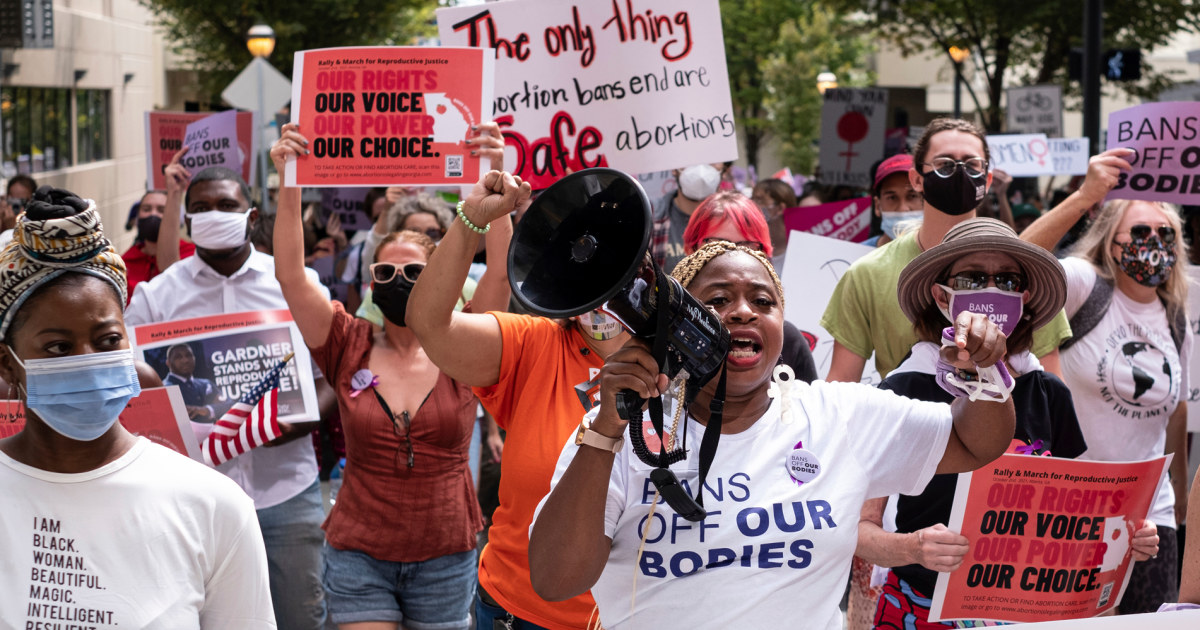
When Donald Trump was elected president, Marcela Howell, the founder and executive director of a national reproductive justice advocacy group in Washington, D.C., said she and other leaders immediately began to consider ways to protect Roe v. Wade should it come under attack.
After a leaked draft opinion last month suggested the Supreme Court was ready to overturn the constitutional right to abortion, the group she leads, In Our Own Voice: National Black Women’s Reproductive Justice Agenda, began to make concerted efforts to reach Black women voters across the country. If Roe is overturned, Howell said the organization would work with its partners and abortion fund-raising groups to provide resources for women.
In interviews with NBC News, Howell and other Black leaders said they weren’t surprised by the draft opinion because they had been anticipating it for years as a result of continuing abortion rights rollbacks across the country. In 2021 alone, states enacted more than 100 abortion restrictions, according to the Guttmacher Institute, which studies and promotes reproductive rights. But leaders are still preparing for how to deal with the aftermath.
“None of this is different. This has been happening forever,” said Linda Goler Blount, president and CEO of the Black Women’s Health Imperative. “It’s in the news, perhaps in a different way. But there’s nothing new about this.”
Howell said that low-income people in particular faced hurdles for years. Because the Hyde Amendment prohibits federal funds from being used to cover most abortions, poor women aren’t able to use Medicaid to pay for the cost of treatment.
“There are all these kinds of barriers that have been set in front of women of low income, which are predominantly women of color. And those barriers have been there,” Howell said. “So Roe has always been the floor, not the ceiling.”
But Roe’s demise means that 23 states would ban almost all abortions immediately, with trigger laws (abortion restrictions that remain unenforceable while Roe is in place), in 13 of them, forcing women to travel out of state to obtain abortion services.
In response to the leaked draft, Chicago Mayor Lori Lightfoot announced the Justice for All Pledge, $500,000 to help residents and people seeking abortions in neighboring states “that have or ultimately will ban abortion if the Supreme Court decides to strike down Roe v. Wade, as outlined in the leaked decision.”
The Black Women’s Health Imperative has a program at historically Black colleges called My Sister’s Keeper, which, among other issues, promotes health and reproductive justice. An app accessible through the campus program informs people what health services are available near them, Blount said.
Yazmine Pleasant, 20, is a member of the My Sister’s Keeper group at Southern University in Baton Rouge, Louisiana, where she is a junior. The group meets regularly and has discussed how to move forward if Roe v. Wade is overturned. Of particular importance to the group, she said, is how to help victims of incest and rape seeking abortions, along with providing mental health support. The group hosts a handful of events each semester.
In the wake of the leaked draft, Blount, who is an epidemiologist, said her organization has been collecting and reviewing data to determine how to legally provide women access to medication abortion, especially in places like Mississippi, which has one abortion clinic, and in states that have trigger laws that would ban abortion immediately if Roe is overturned.
Whether this will affect the upcoming midterm elections remains to be seen. LaTosha Brown, a founder of Black Voters Matter, said Black people “don’t have the luxury of organizing just from a single issue.
“What resonates with the way that we’re organizing is that we organized this as a connected issue — abortion rights, voting rights —all of those things are all connected,” Brown said. “They’re not different.”
It’s no coincidence, Howell said, that some of the states passing restrictive voting laws, which disproportionately affect people of color, are also some of the same states that already have or are trying to enact abortion bans. After the draft leaked, Senate Minority Leader Mitch McConnell, R-Ky., raised the possibility of a nationwide abortion ban, Howell said, which contradicts claims by Republicans that abortion should have always been a state issue.
“And that tells us exactly what’s behind all of this,” Howell said. “It’s not just about this religious belief that they’re all espousing, that they have about when life begins. What they really want is control over what women do, their bodies and how Black voters can vote.”
To that end, Howell said her own organization plans to send targeted mailers to Black women voters in different states, and place ads in newspapers, once the Supreme Court releases its final decision in Roe v. Wade. The ads will focus on what “voting means this time around,” she said.
Source: | This article originally belongs to Nbcnews.com









